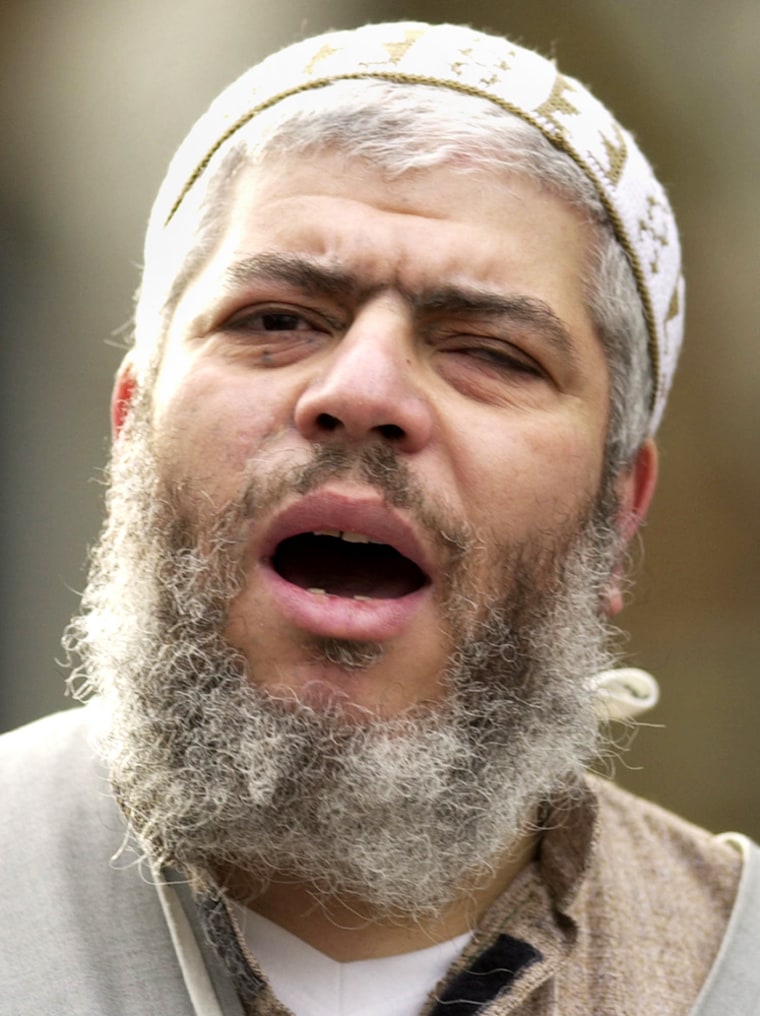The British Muslim cleric whose North London mosque was the centerpiece of some of the most important terrorism cases of the last decade was sentenced to seven years jail on Tuesday for inciting murder in his sermons.
Egyptian-born Abu Hamza al-Masri, 47, was the highest-profile Muslim cleric tried in the United Kingdom since the Sept. 11, 2001, attacks on the United States.
The followers who worshipped at his Finsbury Park Mosque included convicted “shoe bomber” Richard Reid and “20th hijacker” Zacarias Moussaoui.
Hamza was convicted on 11 counts including soliciting murder, stirring up racial hatred and possessing a training manual “of use to terrorists.” The judge ordered him to serve all 11 sentences concurrently, the longest of which was seven years.
'A real danger'
Judge Anthony Hughes said he had no idea whether anybody ever acted on Hamza’s violent sermons but they “created a real danger to the lives of innocent people in different parts of the world.”
Hamza could have faced life. He also remains wanted by Washington on charges of attempting to set up a “terrorist training camp” in the state of Oregon, and could be extradited, possibly before serving out his full term in Britain.
Although British police never linked him directly to any specific plot, they long said his mosque acted as a base for militants. British authorities previously tried to revoke his citizenship, but for years brought no criminal case against him.
His conviction for incitement comes as the U.K. government is placing more emphasis on crimes like glorifying terrorism, a trend that has raised free speech concerns.
“Free speech is important in our democratic and multi-faith society but encouraging murder and inciting hatred against others because of their race will never be tolerated,” the government’s top lawyer, Attorney General Lord Peter Goldsmith said in a statement.
'Londonistan'
Most of the charges for which Hamza was convicted stem from sermons he delivered in the late 1990s, a time when European security services were describing the British capital as “Londonistan,” a hotbed for radicals clustered around Finsbury Park.
“The mosque itself comes into dozens of international extremist and anti-terrorist investigations across the world,” a police source said, speaking under customary anonymity requested by British police briefing reporters.
“It was seen and known as a safe haven to meet like-minded people, somewhere to get connections and to get orientated.”
Among those who worshipped there were Reid, who tried to blow up an airliner over the Atlantic, and Moussaoui, now fighting the death penalty after pleading guilty to conspiracy charges related to the Sept. 11 attacks.
Suspects in the Madrid bombings of 2004 are thought to have visited the mosque and a plot to carry out chemical attacks with the poison ricin, for which an Algerian man was convicted last year, involved men who all worshipped there.
U.K. terrorist training camps?
Police have also revealed for the first time that they had found material at the mosque they believed was used for terrorism training camps in Britain.
In January 2003, about 150 British police staged a pre-dawn raid on the mosque. Inside they discovered gas masks, protective suits for chemical or biological weapons, blank passports, hunting knives, and blank-firing weapons.
Hamza, who has one eye and wears a hook in place of one of the two hands he is believed to have lost in Afghanistan, has been a hate figure in the British tabloid press.
He testified on his own behalf at his trial at London’s Old Bailey court, saying his sermons had praised the act of killing in holy war, but not murder. His lawyers said he had been the victim of a smear.
“Mr. Hamza is probably the most frequently abused and ridiculed person in this country,” his lawyer told the court. “They call him Captain Hook. Hook. Hooky.... They run headlines like ‘Hook Off.’”
But in private Hamza is widely said to be calm, polite and thoughtful.
“It would be a mistake to regard him as a buffoon,” the police source said. “He’s become something of a caricature in the media and that isn’t the right perception of him.”
